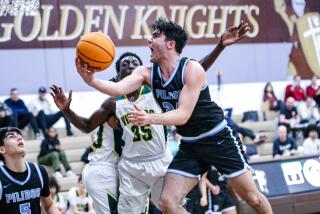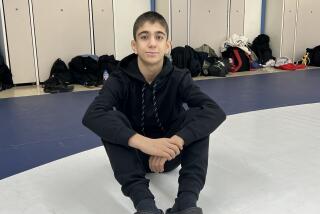Countywide : Teen Makes the Right Chess Moves
- Share via
Harry Akopyan, 13, plays chess on his computer more and more these days. He has to, because few players his age can beat him.
On occasion, he plays against his father, but Onik Akopyan, 54, is no match for his son, either.
Akopyan, a sixth-grader at Los Feliz Elementary School in Los Angeles, is the national elementary school chess champion, a title he has won for the past five years.
Last week, Akopyan had the chance to challenge other kids when he took on 14 youngsters ages 7 to 14. Simultaneously.
The result: 12 wins, one loss and one draw.
Played at the Chess for Juniors Center on Westminster Avenue in Garden Grove, the matches were Akopyan’s first since winning this month’s national elementary school championship in San Jose.
More than 1,000 kindergarten to sixth-grade students from around the country took part in the championship. Akopyan also won the speed tournament, in which players play against the clock, and against each other.
“I guess it’s winning that I like most about chess,” said Akopyan, who came to the United States from his native Armenia when he was 7 years old.
On Saturday, in faded denim pants, a blue T-shirt and a baseball cap, Akopyan faced 12 boys and two girls across two rows of tables. Playing the white pieces, he took just a few seconds to make his moves as he walked from one chessboard to another.
When he was 6, he was one of several players who faced Armenian grand master Arshak Petrosian in a similar match. He lost horribly, he said.
But now, it was his turn to face an array of players.
“I liked it, it made me proud,” Akopyan said.
After more than an hour, the games were finished, and the only winner against Akopyan was the tiniest in the group, 7-year-old Walter (Mao) Shatford, a first-grader at Polytechnic School in Pasadena.
“Watching a 7-year-old play chess is like watching the Rams play football,” said the boy’s father, Walter Shatford III, himself a chess player and a football fan. “It’s very nerve-racking.”
Mao, who learned to play chess when he was 4 years old, surprised Akopyan by capturing a knight and then winning the end game with two passed pawns.
Justin Sheek, who was runner-up to Akopyan in the San Jose tournament, earned the draw. He had two pawns to Akopyan’s one at the end of the 1 1/2-hour play.
Johnny Morgan, 11, a fifth-grader at Liberty Christian in Huntington Beach, was the first of the 14 players to lose to Akopyan, but he said he was happy with his game.
“I played good, but he’s very good,” said Morgan, who played in a New York tournament for junior high school students this year.
Elizabeth Thompson of Cypress, who watched her son, Daniel, lose to Akopyan, said that chess is a worthwhile sport for children.
“It helps him (Daniel) get better organized,” Thompson said. “His problem-solving has improved a lot.”
Robert Snyder, who founded the Chess for Juniors Center in 1983, said that chess teaches logic, concentration and critical thinking. More than 120 boys and girls attend his classes. He is often invited to make chess presentations in schools, he said.
He said that Akopyan is his most talented and hardest-working student.
“He listens, he is easy to work with, and he does not have an ego that gets in the way,” Snyder said.


